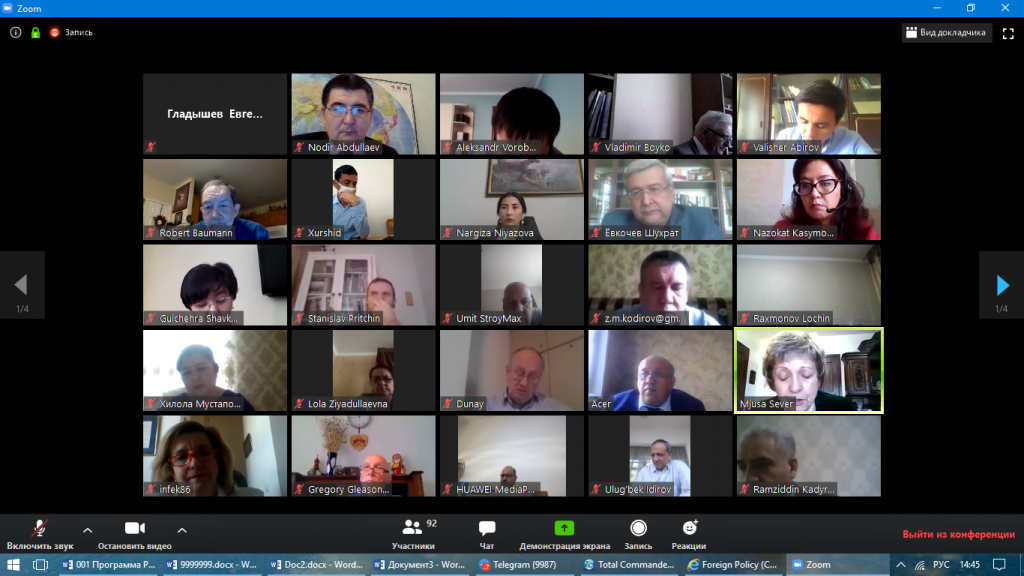International cooperation in the fight against pandemics.

Tashkent State University of Oriental Studies hosted an international online roundtable on “International cooperation in the fight against pandemics: Uzbekistan and international experience.”
The conference was organized online on the Zoom platform and was attended by professors, researchers, master’s and bachelor’s students of the Tashkent State Institute of Oriental Studies, as well as various higher educational institutions of the country. The event was attended by 92 representatives from 7 countries. The event was attended by Uzbek orientalists conducting research in the field of political science, as well as leading experts on international relations from Russia, the United States, Germany, Kazakhstan, Slovenia and Egypt. ‘z shared their thoughts. Among them are scientists of the Institute of Oriental Studies of the Academy of Sciences of the Russian Federation S. Pritchin, A. Vorobiev, N. Mendikovich, professor of Altai State University, Ph.D. V. Boyko, professors of the J. Marshall European Center for Security Studies G. Glizin, Paul Dunay, Professor of the National Defense University B. Todd and Professor of the University of Tennessee A. Korobkov, Director of the Slovenian International Center for Regional Dialogue M ‘ Yusha Sever, Professor of the Medical University of Ljubljana and Expert of the Slovenian Anti-Coronavirus Council B. Beovich, Associate Professor of Al-Farobi National University of Kazakhstan J. Bayzakova, Professor of the German-Kazakh University Sebastian Meyer, Egypt’s Al-Hivor political research Director of the center Ahmad Tahir participated with their reports. At the beginning of the event, the rector of TSIOS G.Sh. Rixsieva thanked foreign experts for the participation in the event. He noted that it provides an opportunity for a comprehensive exchange of views on the measures taken at the state level to prevent.
Referring to the conditions created for professors, young scientists and researchers in the field of higher education and scientific research during the quarantine period, the President of the Republic of Uzbekistan Sh.M.Mirziyoev commented on the content of measures aimed at supporting their activities and ensuring their sustainability.
At the same time, noting that the pandemic is a unique test of the strength of international cooperation, it is important not only to share experience in epidemiological and organizational issues, but also to provide mutual financial, economic and food assistance. He also stressed that he was ready to give. In this regard, he said that no country in Uzbekistan understands that the country’s security, in particular human security, cannot be fully ensured by eradicating the coronavirus only in its own country. Therefore, noting that international organizations are ready to provide the necessary assistance to Uzbekistan, in 2020 it is planned to use $ 2.7 billion directed by international and foreign financial institutions such as the Asian Development Bank, the World Bank and the Japan International Cooperation Agency. , financial institutions are allocating $ 277 million to the health sector to fight the pandemic. At the event, Myusha Sever, Director of the Slovenian International Dialogue Center, praised the work of Uzbek anti-crisis officials, noting that globalization has created favorable conditions for such a large-scale pandemic.
He noted that the current level of international openness in the case of Uzbekistan will lead to a number of bureaucratic difficulties.
According to PhD researcher of the Institute of Oriental Studies of the Academy of Sciences of the Russian Federation S. Pritchin, Uzbekistan has mobilized all its resources in a short period of time among the Central Asian republics and adopted a program of measures to combat the negative effects of the spread of coronavirus in the country. As a result of anti-crisis measures in the country, Uzbekistan is currently providing humanitarian assistance to a number of countries.
According to G. Glizin, a professor at the J. Marshall European Center for Security Studies in the United States, the pandemic is shaping a new system of global international security architecture in which human security is a priority. This, in turn, will help to achieve positive results in efforts to resolve regional and international conflicts. Paul Dunay, a Hungarian expert working at the center, commented on the government’s anti-crisis policy in the country, noting that the measures taken in this regard have not yielded practical results. He noted that there are not enough opportunities for distance learning in Hungary, but that digital technologies are not fully implemented in a number of other social spheres. That, in turn, is evident in the current context.
At the end of the event, all participants visited the University of Oriental Studies of the Tashkent State to discuss the current state of international cooperation in combating the spread of coronavirus and international post-pandemic relations, as well as anti-crisis measures and efforts to prevent its negative consequences. They thanked for organizing international debates on issues related to the pandemic, noting that all this, in turn, would strengthen international cooperation in combating pandemics.